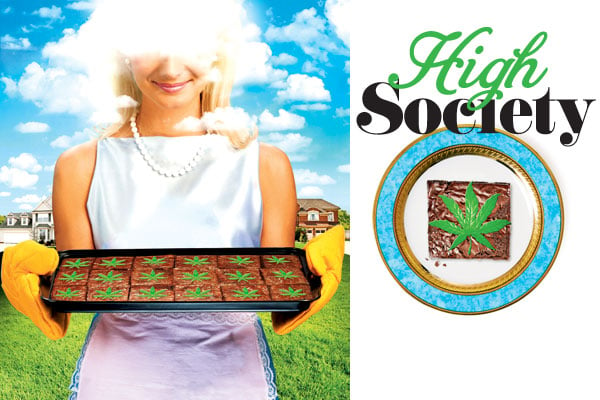Illustration by Jesse Lenz.
At 8 o’clock on a chilly autumn weeknight, Sara makes her way across DC’s Mount Pleasant neighborhood to deliver a cutely wrapped package to the home of a high-powered attorney.
Despite the drugs in her car, she doesn’t look nervous, even when she makes an illegal left turn a few blocks after she passes a police van. “Can I do this?” she says. “Is this legal? I can’t tell. I’m doing it!”
Nearing the lawyer’s home, she says, “If you don’t look or act nervous, no one will know.” She explains how she regularly brings her deliveries through security at law firms and government agencies: “I look and act professional, I smile, I’m friendly, and you think I’m a legitimate business owner.”
Fit, pretty, and just shy of 40, Sara’s not what most people picture when they think of a drug dealer. In her Banana Republic sweater and Joe’s Jeans, she seems more like a delivery girl for a high-end bakery.
She uses a pseudonym that plays off baking and marijuana—we’ll call her Sara Leaf—and is one of a handful of women known as the Nancy Botwins of Washington, after Mary-Louise Parker’s character on Showtime’s Weeds, a suburban single mom who deals pot to support her family.
Two years ago, Sara quit her marketing job “because I was sick of the grind, spending 2½ hours commuting to do something I didn’t love anymore.” Finding herself with a lot of time, she parlayed a talent for baking into a new job.
Now she bakes marijuana into brownies, cookies, candy, and other treats and sells them—often to people who are chronically or terminally ill and who take the edibles to ease pain and alleviate side effects from chemotherapy and other treatments.
Sara doesn’t consider herself a drug dealer, though. When I ask what she calls herself, she pauses. “A gourmet cook? A baker? It’s a good question,” she says. “The reason I do what I do is to help people. My husband jokes that I’m a ‘pharmaceutical redistributor.’ ”
The distinctions should soon grow even hazier. The DC Council passed a measure in 2010 that legalized medical marijuana for people with certain conditions. According to the DC Department of Health, which will oversee the new medical-marijuana program, dispensaries could open this summer. As the program nears readiness, it has become clear that our area—in the federal government’s back yard—is probably the most complicated place in the country in which to regulate medical marijuana.
Legal or not, the plant already plays a big role in Washington. A 2011 report by the Substance Abuse and Mental Health Services Administration found that about 14 percent of DC residents over age 12 and about 10 percent in Maryland and Virginia had used pot in the past year. The marijuana use cuts across racial and socioeconomic lines.
“This is a town where I could probably kill 200 major careers if I wanted to be a complete prick,” says Allen St. Pierre, executive director of the National Organization for the Reform of Marijuana Laws (NORML), which is headquartered on K Street. “Politicians, members of Congress and the Senate, many of their principals—legislative directors, chiefs of staff, communications directors—people in the private sector, Cato Institute, American Enterprise Institute, Brookings, police, any number of notable journalists from television, print, radio, many brand names most Americans would recognize pretty quickly—I’ve smoked with all of them. There is more smoke in DC closets than there is sex.”
Marijuana shows up at high-society parties in DC’s tony Kalorama and on back patios at embassy functions. It’s a staple at both a guys’ poker night for well-known DC power players and a moms’ Friday-night get-together in Bethesda. About twice a month, one Georgetown businessman hosts after-hours parties at his home where pot and cocaine “are in abundance,” says an attendee. Some of the Georgetown elite, professional athletes, Redskinettes, and Playboy centerfolds have been known to stop by.
Almost every weekend, one fortyish lawyer puts her toddler to bed (“he’s a good sleeper”) and then hosts a gathering in her million-dollar Northern Virginia home for about 15 friends—mostly lawyers, executives, and “leisure class” thirty- and fortysomethings. Sometimes she serves wine and cheese, sometimes she cooks, and sometimes they make pizza. Always by the end of the night, a bong appears on her kitchen island.
“It’s super-bougie,” says a 33-year-old public-relations executive who attends the dinner. “We’re talking about politics, current events. These are all highly educated people with at least one advanced degree who don’t drink much or smoke cigarettes. At around 9:45—earlier if someone’s had a hard day—the bong will come out. We use a long lighter like you’d use to light a gas fireplace, which I always think is funny, and somehow makes me feel more adult. It’s fairly tame.”
It’s also fairly common. For many, a hit before bedtime eases insomnia. “Better pot than Ambien,” the PR exec says. For others, it calms the tensions of the 80-hour workweek.
“For people who have really high-producing, high-stress jobs, it’s like this is my break in order to release a lot of the stress,” says a 37-year-old who used to work in politics. She smokes with friends “in high-ranking government positions, including a friend who interacts with the President every day.”
She and other users believe they need to toe a line of secrecy in the nation’s capital. “The perception is still ‘if you’re a pothead, you’re a slacker,’ ” she says. “You don’t want everyone to get so comfortable that it’s an open secret. It’s fine for it to be a closed secret as long as you’re still showing up and getting massive amounts of work done.”


















